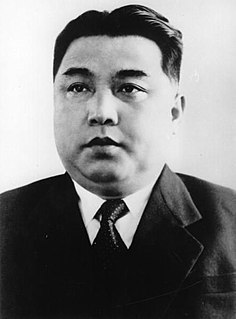A Quote by Kim Il-sung
The people are the masters of the revolution in each country.
Quote Topics
Related Quotes
A revolution is bloody, but America is in a unique position. She's the only country in history in a position actually to become involved in a bloodless revolution. The Russian revolution was bloody, Chinese revolution was bloody, French revolution was bloody, Cuban revolution was bloody, and there was nothing more bloody then the American Revolution. But today this country can become involved in a revolution that won't take bloodshed. All she's got to do is give the black man in this country everything that's due him, everything.
In a nutshell, the idea of Juche means that the masters of the revolution and the work of construction are the masses of the people and that they are also the motive force of the revolution and the work of construction. In other words, one is responsible for one's own destiny and one has also the capacity for hewing out one's own destiny.
We have become the new american slaves: but there is a revolution coming. It is a revolution of individual liberty. It will free us without violence. It will begin with the self. It will spread to the workplace. It will turn our corporate masters into our servants. It will free us of government's tyranny. The revolution will spread to all corners of the nation, and at last, we shall be free.
We Marxists believe that a revolution will also take place in other countries. But it will take place only when the revolutionaries in those countries think it possible, or necessary. The export of revolution is nonsense. Every country will make its own revolution if it wants to, and if it does not want to, there will be no revolution.
As to the history of the revolution, my ideas may be peculiar, perhaps singular. What do we mean by the revolution? The war? That was no part of the revolution; it was only an effect and consequence of it. The revolution was in the minds of the people, and this was effected from 1760 to 1775, in the course of fifteen years, before a drop of blood was shed at Lexington.
We said that each time a country is liberated it is a defeat for the world imperialist system. But we must agree that the break is not achieved by the mere act of proclaiming independence or winning an armed victory in a revolution. It is achieved when imperialist economic domination over a people is brought to an end.
First, what is a revolution? Sometimes I'm inclined to believe that many of our people are using this word "revolution" loosely, without taking careful consideration [of] what this word actually means, and what its historic characteristics are. When you study the historic nature of revolutions, the motive of a revolution, the objective of a revolution, and the result of a revolution, and the methods used in a revolution, you may change words. You may devise another program. You may change your goal and you may change your mind.





































